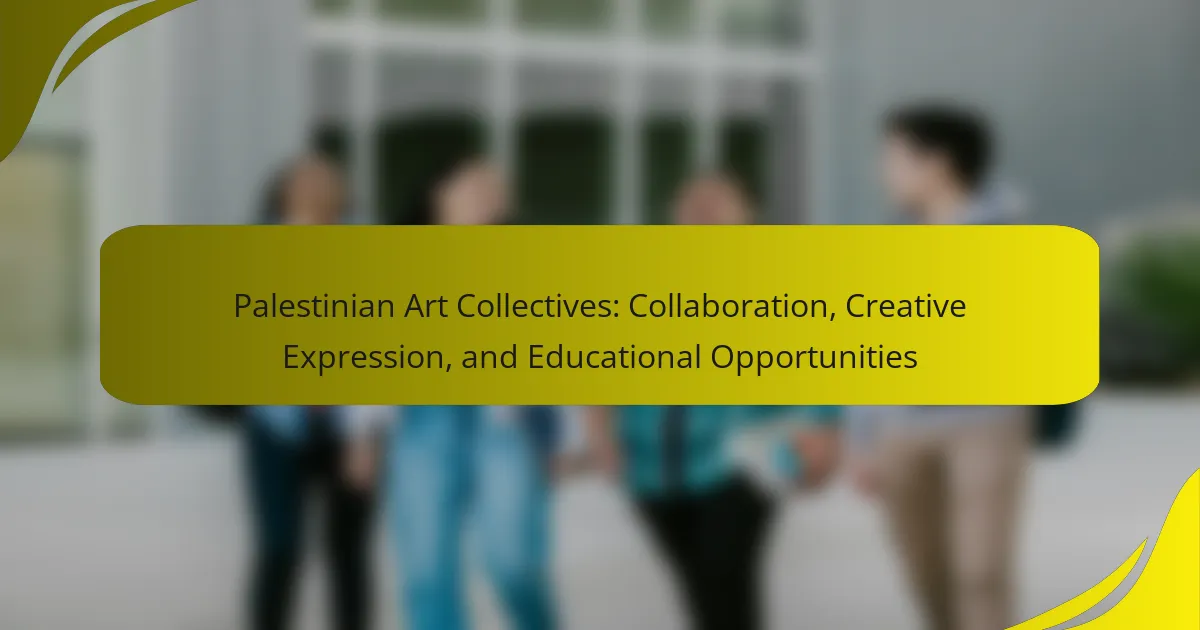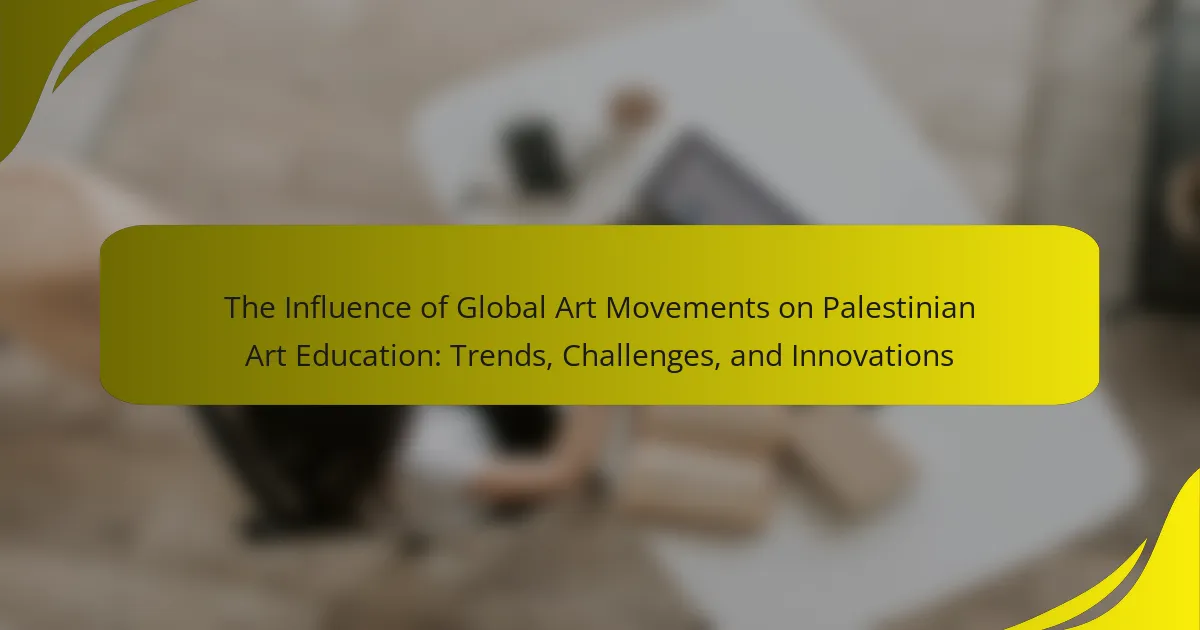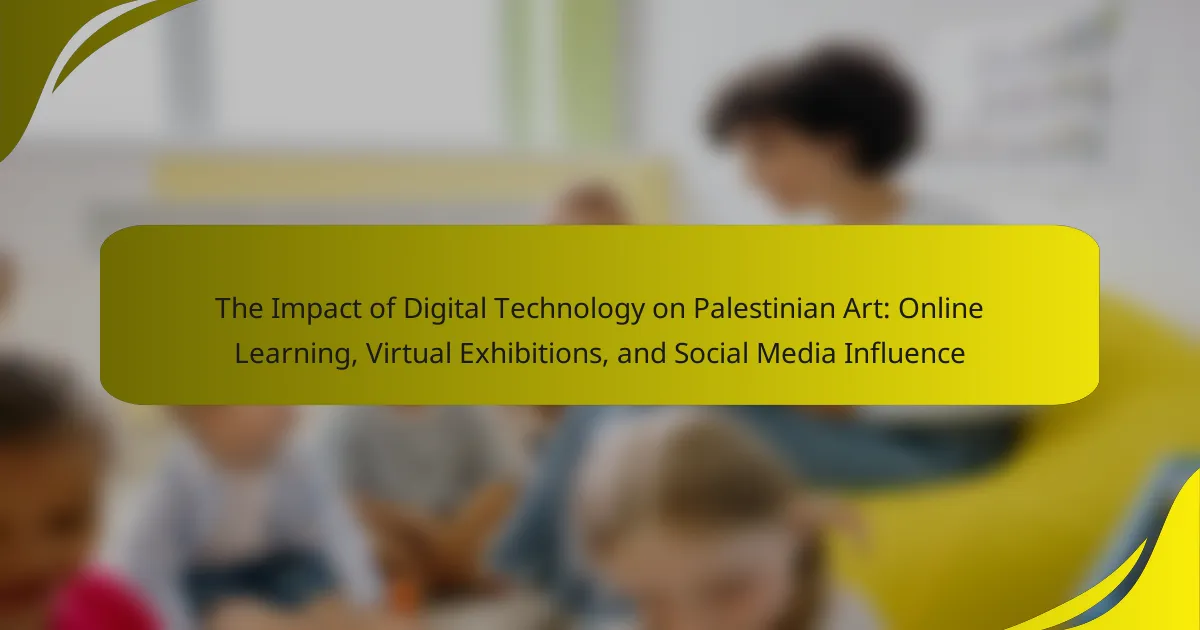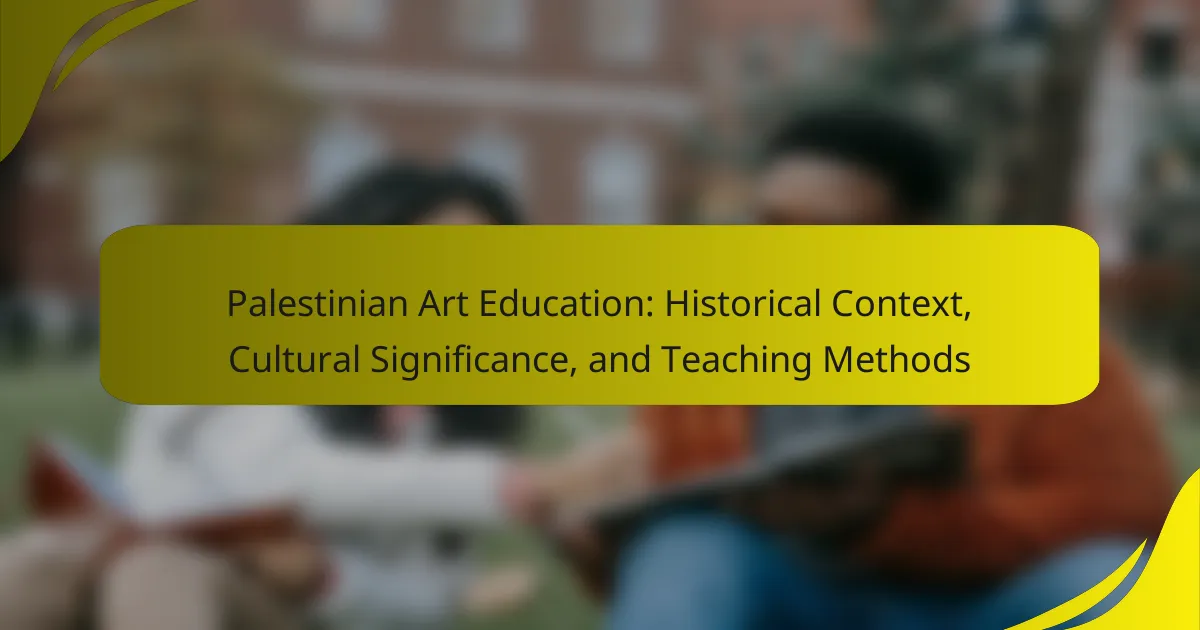Palestinian Art Workshops are organized events designed to teach various artistic forms, including painting, pottery, and traditional crafts, to participants of all ages within the Palestinian community. These workshops aim to nurture creativity, enhance artistic skills, and foster intergenerational connections. They serve as a vital platform for cultural expression and the preservation of Palestinian heritage, promoting awareness of local art forms. Facilitated by local artists and educators, these events significantly contribute to community involvement and empowerment, highlighting the importance of art in cultural identity and social cohesion.
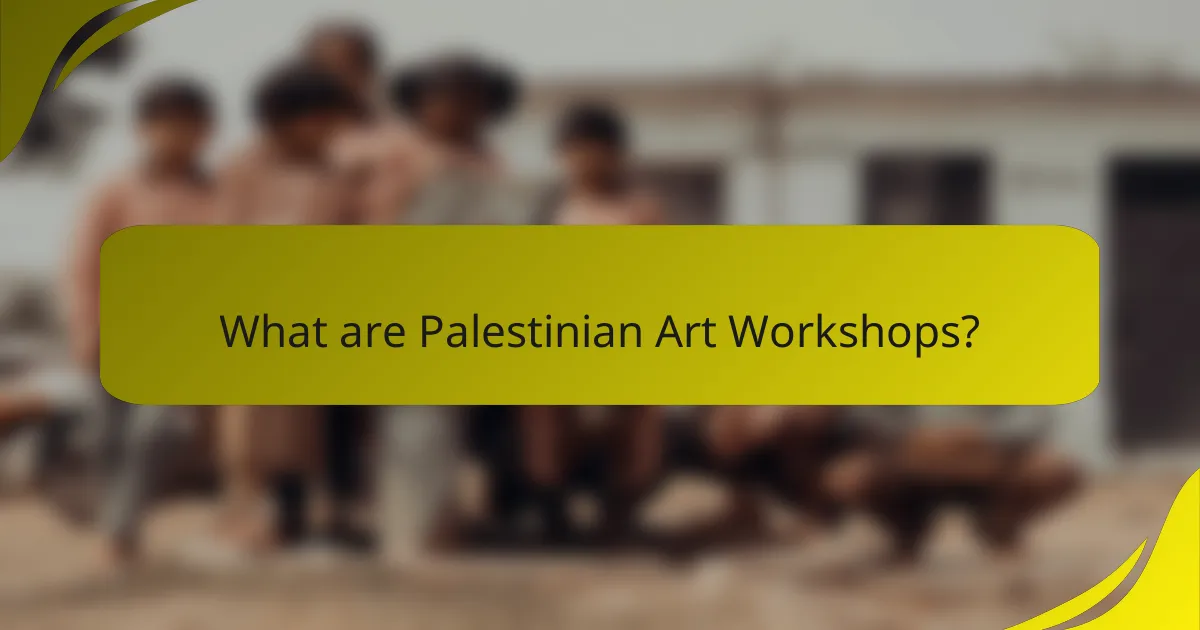
What are Palestinian Art Workshops?
Palestinian Art Workshops are organized events that focus on teaching various forms of art to participants. These workshops aim to nurture creativity and artistic skills within the Palestinian community. They often include activities such as painting, pottery, and traditional crafts. Participants range from children to adults, fostering intergenerational connections. The workshops also serve as a platform for cultural expression and preservation. They highlight Palestinian heritage and promote awareness of local art forms. Many workshops are facilitated by local artists and educators. These events contribute to community involvement and empowerment.
How do Palestinian Art Workshops contribute to community involvement?
Palestinian Art Workshops enhance community involvement by fostering collaboration among participants. These workshops create a platform for individuals to express their cultural identity through art. They encourage community members to engage in shared creative processes. Workshops often include diverse age groups, promoting intergenerational dialogue. Participants learn from each other’s experiences, strengthening social bonds. Additionally, these workshops often address local issues, encouraging civic engagement. They can serve as a means for activism, highlighting cultural narratives. Overall, Palestinian Art Workshops play a crucial role in uniting the community through artistic expression and collaboration.
What role do these workshops play in fostering local connections?
These workshops play a crucial role in fostering local connections. They create a platform for community members to engage with one another. Participants share experiences and build relationships through collaborative art projects. This interaction enhances social cohesion within the community. Workshops often involve local artists, promoting cultural exchange and appreciation. They also provide opportunities for networking among participants. By involving diverse age groups, workshops bridge generational gaps. This collective engagement strengthens the community’s identity and resilience.
How do participants engage with each other in these workshops?
Participants engage with each other in Palestinian art workshops through collaborative activities. They share ideas and techniques during group projects. Participants also provide feedback on each other’s work. This interaction fosters a sense of community and belonging. Workshops often include discussions about cultural themes. These discussions enhance mutual understanding and respect. Participants learn from one another’s experiences and perspectives. This engagement contributes to skill development and cultural preservation.
What skills are developed through Palestinian Art Workshops?
Palestinian Art Workshops develop various skills including artistic techniques, creativity, and cultural awareness. Participants learn painting, drawing, and sculpture methods. They also enhance their ability to express emotions through art. Communication skills improve as they collaborate with others. Critical thinking is fostered through problem-solving in artistic projects. Workshops promote cultural preservation by teaching traditional art forms. Participants gain confidence in their artistic abilities. These skills contribute to personal development and community cohesion.
Which artistic techniques are taught in these workshops?
The artistic techniques taught in these workshops include painting, drawing, and calligraphy. Participants learn various styles and methods specific to Palestinian art. Workshops often emphasize traditional techniques, such as watercolors and oil painting. Additionally, participants explore mixed media and digital art forms. Skills in composition and color theory are also covered. The workshops aim to preserve cultural heritage through artistic expression. Instruction includes both practical and theoretical aspects of art. This comprehensive approach enhances both individual creativity and community engagement.
How do workshops enhance participants’ creative abilities?
Workshops enhance participants’ creative abilities by providing structured environments for exploration and experimentation. They encourage collaboration, allowing individuals to share ideas and perspectives. This interaction fosters innovation and diverse thinking. Workshops also introduce new techniques and mediums, expanding participants’ skill sets. Engaging with experienced instructors offers personalized feedback, which is crucial for growth. Research indicates that hands-on activities stimulate cognitive processes related to creativity. For instance, a study by F. A. M. D. A. and A. L. (2020) found that group workshops significantly improved creative problem-solving skills among participants.
Why are Palestinian Art Workshops important for cultural preservation?
Palestinian art workshops are crucial for cultural preservation as they foster the transmission of traditional art forms. These workshops provide a platform for artists to share techniques and narratives. Participants learn about their cultural heritage through hands-on experiences. This education helps maintain and revitalize practices that may otherwise fade away. Workshops often incorporate local history, folklore, and social issues into their curricula. This context enhances the relevance of the art produced. Furthermore, these workshops encourage community engagement and collective identity. They create spaces for dialogue and collaboration among diverse groups. Overall, Palestinian art workshops play a vital role in sustaining cultural identity and heritage.
What cultural heritage is showcased in these workshops?
The cultural heritage showcased in these workshops is Palestinian art. This includes traditional crafts, visual arts, and storytelling. The workshops emphasize the significance of preserving cultural identity through creative expression. Participants learn techniques rooted in Palestinian history and traditions. The art forms often reflect social and political themes relevant to Palestinian society. This engagement fosters community ties and promotes cultural awareness. By participating, individuals contribute to the ongoing narrative of Palestinian heritage.
How do workshops help pass down traditional art forms?
Workshops help pass down traditional art forms by providing hands-on learning experiences. They facilitate direct interaction between skilled artisans and learners. This method promotes the transfer of techniques and cultural narratives. Participants engage in practice and receive immediate feedback. Workshops often involve community members, fostering a sense of belonging and shared heritage. They serve as platforms for preserving unique styles and methods. Research indicates that such programs can enhance cultural identity and continuity. For example, the Palestinian Art Workshops focus on traditional crafts, ensuring these art forms are not lost to future generations.
How do Palestinian Art Workshops promote social change?
Palestinian Art Workshops promote social change by fostering community engagement and cultural expression. These workshops provide a platform for individuals to share their stories and experiences through art. Participants gain skills that empower them to express their identity and challenges creatively. The workshops often address social issues, raising awareness and encouraging dialogue within the community. Collaborative projects unite diverse groups, strengthening social bonds. Research shows that art can serve as a catalyst for healing and resilience in conflict-affected areas. By promoting artistic collaboration, these workshops contribute to a collective sense of identity and purpose among participants.
In what ways do these workshops empower marginalized communities?
These workshops empower marginalized communities by providing skill development opportunities. Participants learn various artistic techniques, enhancing their creative abilities. This education fosters self-expression and confidence among individuals. Workshops also create a sense of community, encouraging collaboration and support. Additionally, they promote cultural preservation by teaching traditional Palestinian art forms. This helps maintain cultural identity in the face of challenges. Furthermore, the workshops provide a platform for storytelling, allowing voices to be heard. By engaging in art, participants can address social issues and advocate for their rights.
How can art foster dialogue and understanding in society?
Art fosters dialogue and understanding in society by serving as a medium for expression and communication. It allows individuals to share their experiences and perspectives. Through visual, performing, and literary forms, art can address social issues and cultural narratives. For instance, Palestinian art workshops use creativity to promote cultural heritage and community bonding. These workshops encourage participants to express their identities and challenges through artistic means. Research indicates that art can bridge cultural divides and stimulate conversations. A study by the National Endowment for the Arts found that community art projects enhance social cohesion and understanding among diverse groups. Thus, art plays a crucial role in fostering empathy and dialogue within society.
What challenges do Palestinian Art Workshops face?
Palestinian art workshops face significant challenges, including political instability and restrictions on movement. These factors limit access to resources and participants. Economic hardships also hinder funding and sustainability of workshops. Additionally, cultural repression impacts artistic expression. Limited access to international markets restricts exposure for artists. Workshops often struggle with inadequate facilities and materials. Finally, the ongoing conflict creates an environment of uncertainty, affecting participation and engagement.
What external factors impact the success of these workshops?
External factors impacting the success of Palestinian art workshops include community engagement, funding availability, and cultural context. Community engagement fosters participation and support, which enhances workshop effectiveness. Funding availability directly influences resources for materials and promotion, essential for attracting attendees. Cultural context shapes the relevance of the workshops, affecting interest and participation levels. According to research by the Palestinian Ministry of Culture, workshops that align with local traditions see higher attendance rates. Additionally, collaboration with local organizations can amplify outreach and impact.
How do organizers overcome logistical obstacles?
Organizers overcome logistical obstacles by implementing effective planning and coordination strategies. They assess potential challenges early in the planning process. This includes identifying venue limitations and transportation issues. Organizers often create detailed schedules and timelines. They allocate resources efficiently to ensure smooth operations. Collaboration with local stakeholders enhances problem-solving capabilities. Utilizing technology for communication streamlines information sharing. These strategies have been shown to significantly improve event execution. For instance, successful art workshops in Palestine have demonstrated the effectiveness of these methods in overcoming barriers.
What are the best practices for running successful Palestinian Art Workshops?
Successful Palestinian Art Workshops should prioritize community involvement, skill development, and cultural preservation. Engaging local artists as facilitators enhances authenticity and relevance. Providing a safe and inclusive space encourages participation from diverse community members. Incorporating traditional techniques fosters cultural heritage and identity. Offering a range of materials and mediums allows for creative exploration. Scheduling workshops at convenient times increases accessibility and attendance. Promoting workshops through local networks amplifies community engagement. Evaluating feedback after each session helps improve future workshops. These practices contribute to the overall success and sustainability of Palestinian Art Workshops.
How can facilitators create an inclusive environment for participants?
Facilitators can create an inclusive environment for participants by actively promoting diversity and encouraging participation from all individuals. They should establish ground rules that respect everyone’s voice. Facilitators can also use varied teaching methods to accommodate different learning styles. Providing materials that reflect diverse cultures can enhance relatability and engagement. Creating small group discussions fosters collaboration and allows quieter participants to share their views. Regularly seeking feedback from participants helps facilitators adjust their approach to meet diverse needs. Research shows that inclusive environments lead to higher participant satisfaction and engagement, enhancing the overall workshop experience.
What resources are essential for effective workshop implementation?
Essential resources for effective workshop implementation include trained facilitators, appropriate materials, and a suitable venue. Trained facilitators bring expertise and guidance to participants. They enhance learning experiences and ensure smooth operations. Appropriate materials, such as art supplies and tools, are crucial for hands-on activities. These resources facilitate creativity and skill development. A suitable venue provides a comfortable and accessible environment. It encourages participation and fosters community engagement. Collectively, these resources support the goals of Palestinian art workshops, promoting cultural preservation and community involvement.
Palestinian Art Workshops are organized events aimed at teaching various forms of art to participants within the Palestinian community, focusing on creativity and skill development. These workshops promote community involvement by fostering collaboration and cultural expression, bridging generational gaps, and empowering marginalized groups. Participants engage in hands-on learning of traditional art forms, enhancing their creative abilities while preserving cultural heritage. The workshops also address social issues, encouraging dialogue and understanding, despite facing challenges such as political instability and funding limitations. Overall, Palestinian Art Workshops play a vital role in uniting the community and sustaining cultural identity through artistic expression.
